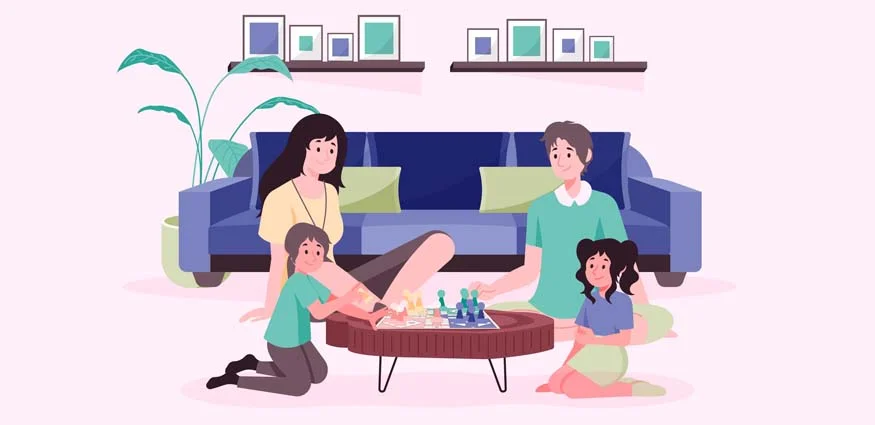Self-esteem is our feelings about ourselves—recognizing strengths and areas for improvement. Parents and teachers are crucial in aiding kids to build positive self-esteem, significantly influencing their mental well-being.
Cultivating a resilient character in children includes fostering confidence, self-love, stability, contentment, and self-pride, paving the way for lasting success and happiness. Lacking self-esteem can hinder personal development and lead to feelings of inferiority that may last into adulthood.
Also Read: The Right Age To Introduce Children’s Blocks
Here is how one can build healthy self-esteem in kids.
- Model self-esteem
- Treat them with respect
- Help them find their strengths
- Praise sincerely
- Build a sense of belonging
- Build purpose
- Encourage healthy friendships
- Emphasise role in the big picture
- Normalise mistakes and failures
Being confident is important because kids often copy their parents.
When parents show they believe in themselves and stay positive, it really helps children feel good about themselves and learn important skills for life.
Disrespect is the biggest damage to children’s self-esteem. Children who face frequent judgement, insult, and mockery are the quickest to lose self-esteem, lack self-confidence and develop an inferiority complex too early during their childhood. It is extremely important to treat children with respect.
Even if you need to discipline them, it needs to be done with a sense of respect. Do not judge them. Encourage them and share your feedback or even criticism with a sense of empathy and respect.
Having a view of their strengths could be the biggest contributor to building healthy self-esteem. As parents and teachers, this is the most critical role we can play in their development.
Expose them to various activities, fields, and hobbies. Keenly observe their activities and help them identify what they are good at. Some might be good at the sciences, others at the more creative arts, some at sports, some in business or commerce.
Some might be excellent orators, others might be good with people, and some might be great individual contributors. Once the kids know about their strengths, it acts as a great ingredient to build their self-esteem. In any weak moment when their self-worth is being tested, these are the strengths that will come to their rescue and sustain their confidence and pride in themself.
Also Read: Guide to Introducing Robotics to Kids at Every Age
Reward and recognition are essential tools to build self-worth, however, they need to be sincere and not fake. Children understand when we are being fake or overzealous in our praise. That could be counterproductive.
Praise the kids for what they achieve. Give them the right amount of praise they deserve. Be sincere in your praise and mean every word of praise you pass on to them. This sincerity in your appreciation will mean a lot to them and help build their self-esteem.
Being liked, loved, or wanted are some things which we all humans desire as social animals. We tend to measure our self-esteem based on how “wanted” we are by the people around us.
It is important that children do not look for this sense of belonging from the outside world and hence the parents and their family need to supply them with a sufficient sense of belonging.
Children need to be introduced to the concept of purpose in life very early in their growth stages. A sense of purpose is critical in building a sense of contribution and self-importance.
Being purpose-driven is a positive reinforcer for healthy self-esteem. Having an aim and an ambition gives purpose to our actions which makes the journey more important than anything else.
This point of view can be very helpful especially when dealing with those around us who are out to damage our self-esteem.
The company we keep becomes very important to our healthy self-esteem. The friends that we keep significantly influence our self-esteem.
Parents must encourage kids to foster healthy friendships that are based on positivity and deferred judgement.
Also Read: What is Line Drawing? How To Teach Basics To Kids
They need to understand their role in the big picture called life. Whether in a classroom as a student, part of a chorus as a singer, involved in choreography as a dancer, or a member of a football team, children should recognize their role in the overall picture. This awareness of contribution fosters a sense of importance and, consequently, boosts their self-esteem.
This sense of contribution will develop their sense of self-importance and thus enhance their self-esteem.
Mistakes or even minor failures can cause serious dents to a child’s self-esteem. A child made his first piece of art and presented it to his family. The family laughed off the child’s work as they found the art funny and pathetic. The child never painted again. Do we want this? No.
Exams are a part and parcel of a child’s life and no one ever succeeds in all their exams. Do not allow mistakes and failures to make easy dents to your self-esteem. Parents and teachers can play a critical role here by normalising and not demonising human errors, mistakes and failures.
Children must be taught to look at failures and mistakes as opportunities to learn from and improve themselves.
One of the key activities that teachers at EuroSchool pursue is to help develop healthy self-esteem for each of our students. We provide individualised focus to help each of our students identify their unique strengths and passions. Our mentors provide them with honest and constructive feedback when they fail and praise them sincerely when they succeed. The highly confident students at EuroSchool are a testament to the success of our efforts in building healthy self-esteem in our students.









